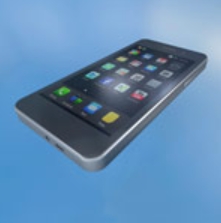Daily use of electronic equipment, like cell phones, laptops or tablet PCs is increasing at a breathtaking pace. At the same time these devices are becoming more powerful and inexpensive from generation to generation while decreasing in size and weight. This trend towards miniaturization can only be achieved with the corresponding materials, the appropriate technologies and bonding processes. Thus for example, cell phone cameras are bonded on a printed circuit board which is then soldered with other SMD components in the reflow oven. This soldering process, in which peak temperatures of 260 °C are reached, requires high resistance on the part of plastic components and adhesives. DELO, manufacturer of industrial adhesives, has developed a new adhesive solution for this purpose that allows Vectra® LCP (Liquid Crystal Polymer) to adhere to FR4 and ceramic boards even after triple reflow process, without loss of adhesion

Vectra® LCP (Liquid Crystal Polymer) from Ticona, worldwide manufacturer of engineering polymers, is an ideal material for fine molded components. This liquid crystal polymer is extremely flowable and fills long, thin and complicated flow paths without problem and with minimal warpage. The material is also inherently flame retardant as well as heat distortion resistant up to 340 °C and has very good strength. "Vectra® LCP delivers the properties that permit further successful development of the miniaturization of electrical equipment. We can solve future tasks in microelectronics even more specifically with the appropriate adhesive systems", underlined Monika Taut, Market Development at Ticona.
In addition to the materials, the corresponding economical bonding technology for the manufacture of electronics components must be found. Thus adhesive bonding is gaining significance and is already frequently used in electronic devices like smart phones, cameras, motion detectors and microphones. The chemical structure of LCP and the typical "outer skin" that forms on the component surface are the reasons that not every adhesive adheres to LCP. The task was to find a suitable solution ensuring adhesive strength despite higher temperatures. Collaboration between the polymer manufacturer Ticona and DELO, manufacturer of industrial adhesives, in the development of adhesive solutions in cameras and microelectronics is pioneering. "We aimed to offer an adhesives portfolio for the various adhesives challenges for LCP bonding", stated Dr. Karl Bitzer, Product Manager at DELO.
The steadily growing inclusion of electronics in our everyday lives entails an increase in the degree of miniaturization. Surface Mounted Device (SMD) technology in which the electronic parts are mounted and soldered on the same side permits ever more narrow installation spaces and thus thinner components. Wireless components are also bonded to the surface of the boards automatically and without drilled holes. This saves space and the density of mounted components can be increased. No wonder that SMD technology is wide-spread in the electrical industry. The reflow process for soldering the electrical components has become prevalent. However this process entails very high temperature of up to 260 °C for brief periods; and all the materials and adhesive bonding have to withstand this undamaged.
DELO develops special adhesives allowing bonding of LCP components to boards with a high degree of reliability. Together with DELO, Ticona has developed a new adhesive system that firmly binds the liquid crystal polymer Vectra® LCP to FR4 and ceramic and withstands the high temperatures of the soldering process.
This special adhesive even fulfills the ambitious aim of not showing any reduction in adhesion even after triple reflow soldering. The test results from Vectra® LCP with the specially developed adhesive show a higher compression shear strength than a standard product even after 24-hour storage at room temperature. And after triple reflow soldering, the measured value was even more than double that of the standard adhesive system (source: Ticona test results of the compression shear strength of Vectra® LCP and various adhesive systems).





